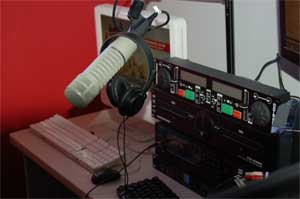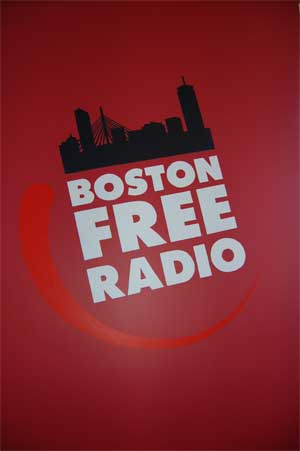
Somerville Community Access Television's new internet radio station is looking for producer. - Photo courtesy of Jessica Barnthouse.
By Peta Jinnath Andersen
Ever wanted to be a real, live DJ? Now’s your chance, because Jessica Barnthouse, the station manager at Boston Free Radio, Somerville Community Access Television’s new internet radio station, is looking for producers.
Barnthouse, also the Membership and Outreach Coordinator, had originally intended to create a community FM station. “I went to a conference in Pittsburgh over the summer,” she said, referring to the Alliance for Community Media National Conference. “And one of the workshops was about how to build a better station.”
The oldest access center in Massachusetts, Somerville Community Access Television’s mission “is to promote free speech and grass roots communication.” SCAT has won several awards; in 2003, the station’s after-school multimedia club, SAY Media! was awarded a “Gold Star” status by the Massachusetts Cultural Council. And the station is always looking for new ways to serve the community.
“A really great way to have a really strong access station is to have as much cool stuff as possible,” Barnthouse says. In Pittsburgh, she drew inspiration from other stations. “Some stations had community stages…some were experimenting with internet radio and I thought that sounded like a really great idea. None of the low power FM station call numbers [were] available [and] internet radio is where the radio is going now, anyway.”
Created in large part during the 90s internet boom, internet radio (also known as “online radio”) has only recently risen to popularity–websites like Pandora, LastFm, and Grooveshark, which offer popular songs for free and some customization of stations have become the norm for many web users. A 2007 report on online radio usage from Arbitron[1] , a media marketing and research firm, found that 29 million people listened to internet radio on a weekly basis.

Much like the station’s television programming community access television, the focus of Boston Free Radio is what Barnthouse calls “free speech radio.” “I think internet radio and free speech go hand-in-hand. Because the internet has such a far reach, free speech radio can be broadcast in countries where freedom of the press might be restricted. It’s also a great way for Boston’s multicultural population to connect with their families and friends in far away places and gain international appeal.”
“People can do absolutely anything…a talk show or music programs, in any language.”
Membership at Boston Free Radio is $60 per year – the fee includes a 90 minute training session on Tuesday, January 11, equipment use, music licensing, and the opportunity to produce an unlimited number of programs. No previous radio experience is required. The program is not limited to Somerville, but open to residents of Massachusetts. The station, Barnthouse says, will be member-run; board members may be required to undertake extra training.
For more information about how to join the station and begin producing a program, email Jessica Barnthouse at manager@bostonFreeRadio.com, or visit the website, BostonFreeRadio.com. Producers who wish to sell advertising on their shows should contact station staff for details.















Reader Comments